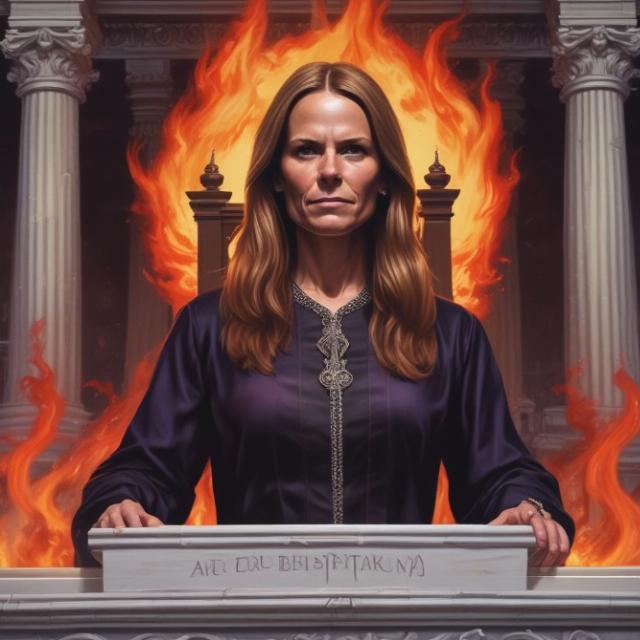Amy Coney Barrett's 'Trojan Horse'
The Supreme Court Trump v. United States ruling that former presidents are entitled to some degree of immunity from criminal prosecution has significant implications for the ongoing legal battles surrounding Donald Trump. This ruling, widely perceived as a victory for Trump, has nuanced elements that warrant closer scrutiny, particularly in the comments made by Justice Amy Coney Barrett.
The Court’s decision confirmed that presidents are protected from prosecution for official actions extending to the "outer perimeter" of their office, while unofficial conduct remains vulnerable to legal scrutiny. This distinction is crucial, as it provides a pathway for prosecutors to refocus their efforts on Trump's private actions.
Justice Barrett’s comments have created a critical, largely overlooked opening for Democrats and their Special Counsel. Barrett hinted that if prosecutors concentrate exclusively on Trump’s private acts, they might succeed in their legal efforts against him. This insight essentially offers a strategic roadmap for those aiming to hold Trump accountable.
The key question here is this: "When Trump was questioning the accuracy of the vote count, was he doing it in his capacity as the U.S. President or as a candidate running for office?"
The Biden campaign, or whoever his replacement is, can expedite the laser-focused case against Trump the campaigner, while niftily bogging down his campaign to fight the newly invented legal action. This perspective implies that Trump’s remarks and actions on January 6, for instance, might be reclassified as those of a candidate rather than a president, thus stripping him of immunity for those specific actions.
Justice Barrett's suggestion does not merely reflect a hypothetical scenario. It outlines a tangible legal strategy. By urging the Special Counsel to fine-tune their indictments to emphasize unequivocally private conduct, Barrett indirectly points to a way to bypass the delays and complications associated with broader, less distinct charges.
This brings to light the broader issue of how legal interpretations can shift political dynamics. The Supreme Court’s ruling and Barrett’s remarks underscore the delicate balance between legal principles and political maneuvering. It raises questions about the extent to which legal strategies are influenced by the political landscape and vice versa.
The implications for Trump are profound. While the ruling ostensibly protects him, it simultaneously invites prosecutors to refine their charges in a manner that could expedite legal proceedings against him. This duality embodies the complexity of navigating legal protections and political vulnerabilities.
Justice Barrett’s comments highlight a critical juncture in the legal proceedings against Trump. By focusing on private acts, prosecutors might navigate around the broad protections of presidential immunity. This insight not only reflects the intricate interplay between law and politics but also sets the stage for potentially significant developments in the ongoing legal battles involving Trump. As these proceedings unfold, they will undoubtedly continue to shape the political landscape leading up to the next election.
Jerry McGlothlin is a seasoned political and media writer and CEO of Special Guests Publicity, a conservative PR agency.

Image: AT via Magic Studio
FOLLOW US ON
Recent Articles
- The Russia Tariff Canard
- When The Government Brutalizes Children
- Trump’s Global Bunker Buster Day
- Phone-Free Schools: Banning Phones to Protect Schoolchildren
- Out-of-Control Courts
- ‘Democracy,’ Establishment Style
- The Truth About Trump’s Tariff Revisions … It’s All About 'The Art of the Deal'
- Remember, MAGA: This is No Time to Go Wobbly
- The Hill of Lies
- Trump’s Tariff Play: The Art of the Economic Reset
Blog Posts
- Disney’s race problem
- Democrats are avoiding Obama like a bad smell
- Axios and the Democrats whine about a female Navy officer losing her job, but leave out the very important why
- Nashville PD on Covenant school shooter: All that talk about wanting to kill ‘white’ kids isn’t about race, but notoriety
- At CU Boulder, Hamas supporters were unceremoniously tossed from a classroom
- Rep. Jasmine Crockett calls on illegals to pick her cotton because 'we done picking cotton'
- Two…men…advance to women’s pool championship
- Let’s talk about the economic collapse and recession that aren’t happening
- Where were all the ‘protesters’ during Biden’s years in office?
- Progressivism is an auto-immune disease
- Time to tariff up: Stop funding our own collapse
- Major victory from SCOTUS in Trump deportation case
- Mississippi on the move
- We called him ‘Daniel el travieso’
- The Supreme Court affirms Justice Boasberg lacked jurisdiction over Trump’s deportation decision under the Alien Enemies Act






